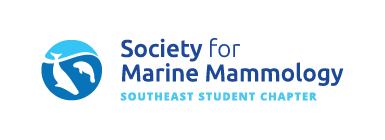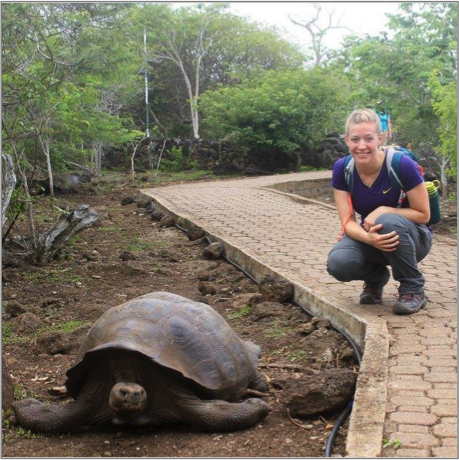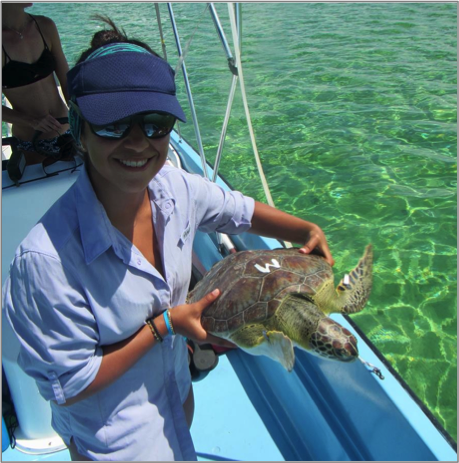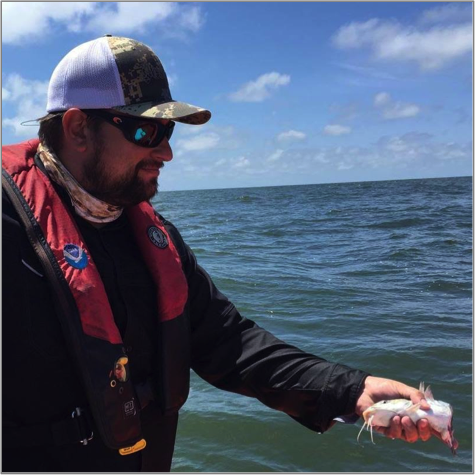 The Southeast Student Chapter (SESC) was established in 2016 as a merger between The Gulf Coast Student Chapter and the Florida Student Chapter. Our mission is to create a welcoming and supportive environment for undergraduate and graduate students in the southeast region of the US and the Caribbean to discuss and foster their interests in the research and conservation of marine mammals.
The Southeast Student Chapter (SESC) was established in 2016 as a merger between The Gulf Coast Student Chapter and the Florida Student Chapter. Our mission is to create a welcoming and supportive environment for undergraduate and graduate students in the southeast region of the US and the Caribbean to discuss and foster their interests in the research and conservation of marine mammals.
We strive to accomplish this goal by holding annual events that bring students together (physically or virtually) to share ideas, share research, learn new tools and techniques through professional development workshops, and foster new professional networks within the field of marine mammalogy.
The Southeast Student Chapter of the Society for Marine Mammalogy is open to undergraduate and graduate students, as well as prospective graduate students, recent graduates (for up to a year after graduating), and postdocs in marine mammal-related studies. We strongly encourage chapter members to be members of the Society for Marine Mammalogy, however it is not required.
This chapter draws members from schools across the entire Southeast region, including the Gulf Coast and Caribbean. North Carolina serves as the northern limit, recognizing that a chapter has formed in DC. Texas serves as the western limit.
To join us and receive information on chapter-related activities, please download our membership form here, fill it out, and email it to: sescsmm@gmail.com. Our Facebook group will have the latest updates for current chapter activities and can be found here: https://www.facebook.com/groups/SESCSMM/
2018 LEADERSHIP TEAM
 SESC President
SESC President
Kayla DaCosta, PhD Candidate, University of South Alabama & Dauphin Island Sea Lab
101 Bienville Blvd
Dauphin Island, AL 36528
Email: kdacosta@disl.org; Phone: 251-861-2141 x7547
Kayla DaCosta received her B.S. degree in Conservation Biology from Brigham Young University. She is currently a Ph.D. student at the University of South Alabama and the Dauphin Island Sea Lab working with Dr. Ruth H. Carmichael. Her dissertation research is on manatee habitat use and population connectivity in the northern Gulf of Mexico using tools such and population genetics, stable isotopes, and trace element analysis. Her research interests broadly include landscape level population connectivity and conservation of protected species.
 SESC Vice President
SESC Vice President
Valeria Paz, PhD Candidate, Florida International University
Department of Biological Sciences
3000 NE 151st St.
Marine Science Building 250L
Miami, FL 33181.
Email: vpaz003@fiu.edu; Phone:786-709-5664
I am a PhD candidate in Mike Heithaus’s lab at Florida International University. I’m excited to be more involved in the Southeast Student Chapter and I hope we can use this chapter as a source of collaboration and support.
My research interests focus on top predator and community ecology. I’m particularly interested in the role that predators play beyond predation, such as their effect on nutrient transport and transformation. My current research entails investigating habitat use, trophic interactions, and behavioral ecology of bottlenose dolphins (Tursiops truncatus) in the highly dynamic Florida Coastal Everglades (FCE). I’m using multiple methods such as stable isotope analysis, passive acoustic monitoring, and focal follows. Ultimately, I hope to that my studies will help predict how predators might respond to environmental variability to better inform Everglades restoration and aid in management and conservation. This project will contribute to the Florida Coastal Everglades Long Term Ecological Research program.
Follow Valeria on twitter to find out more about her research: @VallllPaz
 SESC Secretary & Membership Coordinator
SESC Secretary & Membership Coordinator
Emily Szott, Masters Student, University of North Florida
Department of Biology
1 UNF Dr., Building 59
Jacksonville, FL 32224
Email: e.szott@unf.edu; Phone: 708-745-0978
I am a first-year graduate student originally from Chicago, Illinois. I am getting my Masters of Science in Biology from the University of North Florida. I am in Dr. Quincy Gibson’s dolphin research lab and am researching the spatial and social patterns of the dolphins in the St. Johns River. In my free time, I enjoy scuba diving, kayaking, or just relaxing with a good book.
 SESC Treasurer
SESC Treasurer
Errol Ronje, Masters Student, University of Florida
School of Forest Resources & Conservation
Fisheries & Aquatic Sciences
PO Box 110600
7922 NW 71 st Street
Gainesville, FL 32653
Email: errol.ronje@ufl.edu; Phone: 832-453-9987
I am from the Galveston, TX area but now live in Pascagoula, MS where I work with the National Marine Fisheries Service (NMFS) in the protected species unit, specifically the marine mammal department. My primary interests are bottlenose dolphin populations in the Gulf of Mexico.
I am pursuing a master’s degree at the University of Florida in population ecology. My thesis focuses on the bottlenose dolphin metapopulation of North Texas. Having conducted photo-ID mark-recapture surveys in these areas from 2014-2017, I hope to analyze the data we collected with mark-recapture techniques within a framework of metapopulation theory.
Professional sponsors:
Iske Larkin, PhD (SMM Member)
Lecturer & Education Coordinator College of Veterinary Medicine University of Florida PO Box 100136 2015 SW 16th Ave Gainesville, Florida 32610
Email: ivlarkin@ufl.edu; Phone: 352-294-4095
Mithriel MacKay, PhD (SMM Member)
Director of Research and Education for the Marine and Coastal Ecology Research Center Inc.
Puerto Rico Address:
21 Munoz Rivera, P.O Box 1715
Boquerón, PR 00622
and
State-side Address:
7006 SW 45th Ave,
Gainesville, FL 32608
Email: Mithriel@Marine-Eco.org; Phone: 830-688-9878
Founding Member: Christina Toms (University of Central Florida); Christina.toms@knights.ucf.edu
Past Leadership: Jonathan Cowart (University of Florida), Jessica Jacob (University of Florida), Malin Lilley (University of Southern Mississippi), Amber De Vere (University of Southern Mississippi)